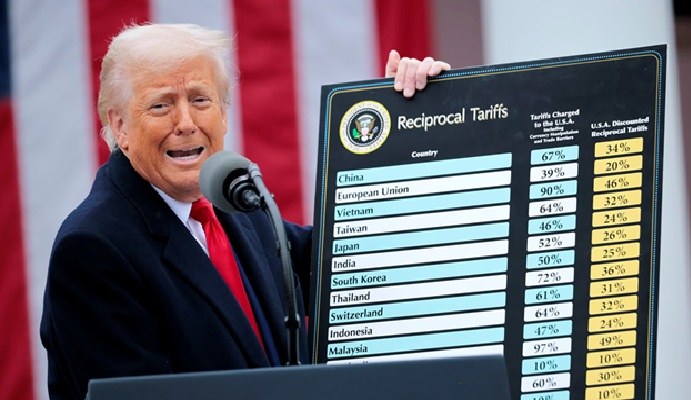
Afrasianet - Dr. Moaz Al-Qaralah - On the evening of a day touted as "Liberation Day", US President Donald Trump is preparing to announce a massive import tariff package, calling it the liberation of America from a global economic "occupation." But what appears to be a triumphant rhetoric may be a declaration of a trade war that threatens the global economic system, and even recalls another chapter in America's trauma-filled history: the 1971 Nixon shock, which left behind a legacy of depression and inflation. Will Washington repeat the same scenario with more aggressive tools?
Nixon's Shock: When the Gold System Collapsed...
In August 1971, French warships coming to retrieve gold deposits from New York were only part of the scene of the collapse of the Bretton Woods system. With pressure mounting – the costly Vietnam War, the rise of the economies of Germany and Japan, and the demand of European countries to take back their gold – President Richard Nixon announced a suspension on dollar-to-gold conversion and a 10% tariff on imports. Despite his political success, the shock turned into an economic nightmare: A three-year depression and chronic inflation throughout the seventies.
Today, he emulates Trump his predecessor with broader tariff measures, but this time the danger is not limited to America alone. The world is no longer about one axis, and emerging economies – especially China – have balancing instruments that were not available half a century ago.
Infernal Trump Plan: Customs Just the Beginning...
Economist Jans Varoufax argues that Trump's strategy is not limited to imposing protectionist tariffs, but is a multi-layered plan aimed at restructuring the global trading system in Washington's favor. By collecting customs revenues — which are administered directly from the White House without congressional intervention — Trump creates a financial and political leverage.
The following steps may include:
1. Dismantling international blocs: By preferring bilateral negotiations – which he masters – over multilateral platforms, he will push countries to compete for individual "deals" with America.
2. Multiplying dollar reserves: It will pressure Asian countries (such as China and Japan) to sell part of their dollar reserves, rebalancing the trade balance in favor of America.
3. Drying up European investments: by enticing German and other companies to move their industries to America through tax incentives or customs threats. 4. Arming economic diplomacy: Increasing U.S. arms sales as a condition for avoiding tariffs, as happened with Saudi Arabia previously.
The goal is clear: whoever accepts a "Trump deal" improves his terms, and whoever refuses pays the price. But is the plan viable?
Wedges of failure: who pays the price?...
Even if Trump succeeds in reducing the trade deficit, the victory may be short-lived:
Internally, the decline in foreign investment on Wall Street will weaken the economy, forcing Trump to choose between betraying the financial elite (which needs an influx of capital) or its working-class support base (which promised it jobs). Externally : China may respond with a preemptive strike by floating the yuan as an alternative to the dollar, while Europe may ally to create a parallel financial system away from U.S. hegemony.
Even more dangerous is the erosion of the liberal economic order that America once led. As Washington gnaws at the principles of the free market and a strong currency, it opens the door to economic chaos that does not last and does not leave.
Tampering with the foundations of the world order...
For years, America, led by Trump, undermined the system it helped build: from withdrawing from international agreements to attacking NATO allies. Today, Western economic philosophy itself – free trade, the sovereignty of supply and demand – is being replaced by a "dirty deal" philosophy of financial blackmail.
The consequences will not be limited to higher commodity prices or declining growth, but may see the birth of a new world order dominated by raw power rather than agreed rules. In this landscape, the American citizen – or the inhabitants of the planet – will only be victims of a battle they have not chosen to fight.
The lesson from Nixon's shock has not been learned: when great powers unleash their narrow interests at the expense of world order, the result is not "liberation," but chaos for which everyone is paying the price.

